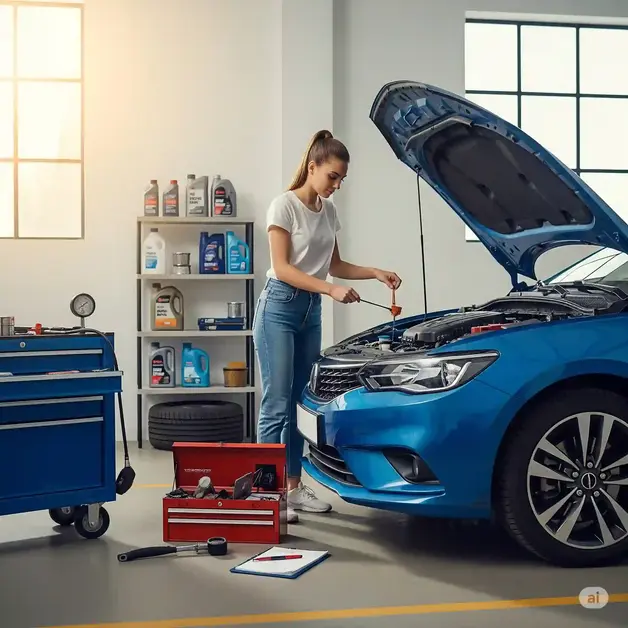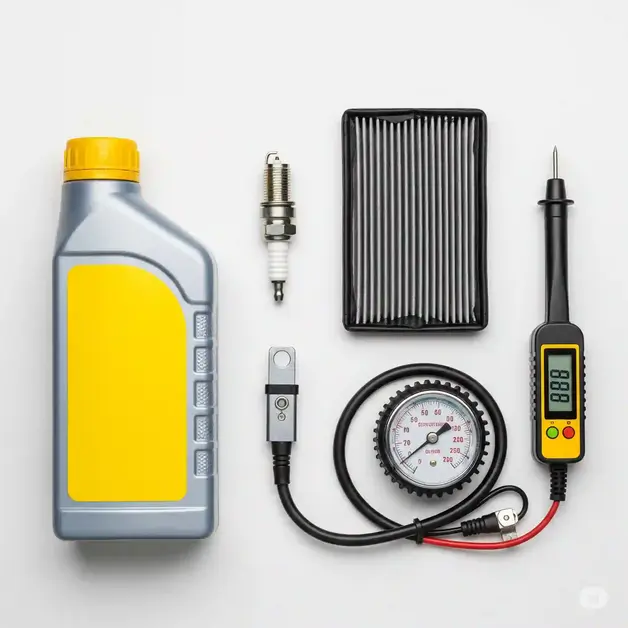Let me be honest—I used to wonder, “Why is it important to keep up with the maintenance on your vehicle?” That was until I skipped a simple oil change and ended up stranded with a seized engine and a wallet that cried for weeks. Taking care of your car isn’t just about avoiding breakdowns—it’s about staying safe, saving money, and keeping your ride running like a dream. In this guide, I’ll share what I’ve learned from both mistakes and wins, including the real facts about car maintenance most people overlook. If you’ve ever put off a service, now’s the time to get back on track—your car (and your bank account) will thank you.
Why Vehicle Maintenance Should Never Be Ignored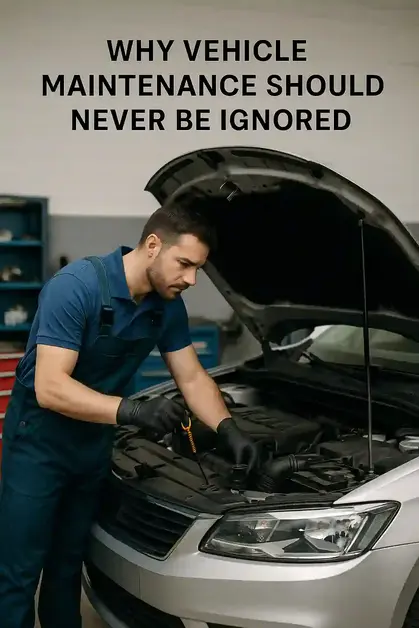
Keeping up with vehicle maintenance is like taking care of your own health. You wouldn’t skip brushing your teeth or drinking water every day, right? Your car’s the same. Small, regular checks—like topping up fluids, inspecting tires, or changing the oil—keep the whole system running smoothly. Most of us only think about our cars when something goes wrong, but by then, the damage is usually done. Preventive maintenance is cheaper, faster, and way less stressful than dealing with surprise breakdowns.
Now here’s the part people often overlook: skipping even the smallest service can lead to a chain reaction. One neglected filter leads to poor fuel economy. One worn-out belt could leave you stranded. When I ignored a tire rotation once, it led to uneven wear and a blowout on the highway. Trust me—there’s nothing like swerving at 60 mph to make you respect tire maintenance. These things don’t just protect your car—they protect you and everyone else on the road.
What most folks don’t realize is that car problems rarely show up all at once. They creep in quietly. The engine gets louder. The mileage gets worse. The steering feels a little off. And before you know it, your “perfectly fine” car becomes a money pit. That’s why keeping a regular maintenance routine matters more than you think. It’s not just about vehicle maintenance—it’s about your freedom to drive without worry, your safety, and your wallet.
So if you’re still wondering why it is important to keep up with the maintenance on your vehicle, here’s the short answer: because your car is only as reliable as the care you give it. Whether it’s your daily commute or a long trip out of town, maintenance is what keeps you moving forward—literally and financially. Don’t wait for the warning lights. Don’t gamble on luck. A little effort now can save you from big regrets later.
What Is Vehicle Maintenance?
Vehicle maintenance is really just a fancy way of saying “taking care of your car before something goes wrong.” It covers everything from changing the oil to checking tire pressure, replacing old filters, and topping off fluids. If you’re wondering what vehicle maintenance is, here’s the short answer: it’s a routine check-up to keep your car running safely, smoothly, and efficiently—kind of like brushing your teeth, but for your vehicle.
Now, there are two types of maintenance most drivers deal with: routine and emergency. Routine maintenance is the stuff you plan ahead for—like oil changes every few thousand miles or rotating your tires. Emergency maintenance? That’s what happens when you don’t do the routine stuff. It’s the unexpected tow truck at 2 a.m., the check engine light that won’t go away, or the brake pads that scream every time you slow down. Trust me, I’ve had both—and routine is always the cheaper, calmer option.
One thing I learned the hard way is that most people miss the small stuff—things like windshield wiper fluid, cabin filters, or low tire pressure. But skipping these “tiny” things adds up fast. For example, I once ignored a low battery warning, thinking it would last a little longer. Spoiler: it didn’t. I ended up stuck in a parking lot with groceries melting in the trunk and no jumper cables in sight.
So when people ask why it is important to keep up with the maintenance on your vehicle, this is what I tell them: it’s not just about preventing disasters—it’s about building a habit of care. Maintenance keeps your car healthy, saves you money, and gives you peace of mind every time you start the engine. You wouldn’t ignore your own health until it’s an emergency, right? Think of your car the same way.
The Importance of Routine Auto Maintenance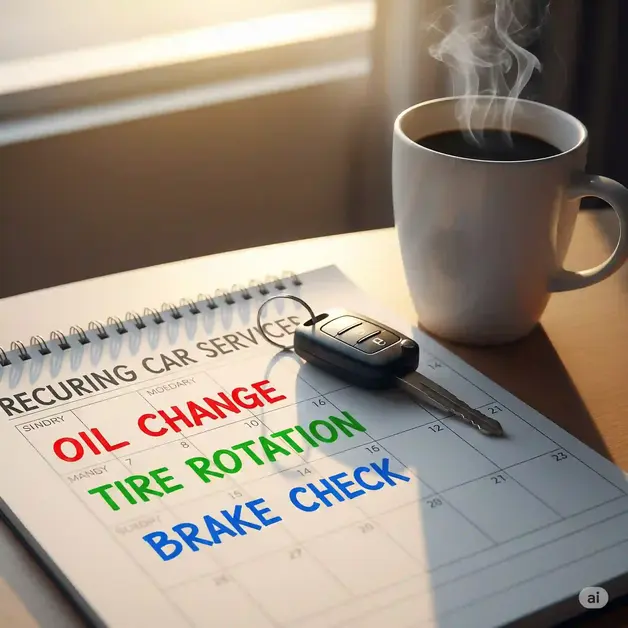
If there’s one habit that’s saved me the most money and stress with my car, it’s sticking to a routine maintenance schedule. You don’t have to be a car expert to know this: skipping basic upkeep almost always leads to bigger, more expensive problems. So if you’ve ever wondered about the importance of routine auto maintenance, here’s the simple truth—it’s the difference between a reliable ride and a car that lets you down when you need it most.
1. Safety First: Prevent Accidents and Breakdowns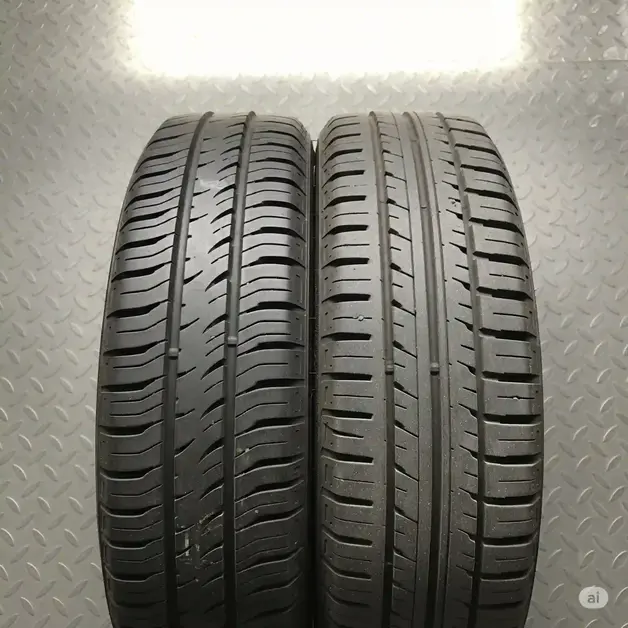
Think of routine checks as your car’s safety net. Keeping an eye on your brakes, tires, fluids, and lights isn’t just good practice—it could literally save your life. I once delayed rotating my tires for months, thinking it wasn’t urgent. That “delay” almost caused a wreck on a wet road when my front tires lost grip—turns out they were way more worn than the rears.
Skipping tire rotations, brake inspections, and fluid checks puts you at higher risk of accidents. It’s not about perfection—it’s about prevention.
2. Reliability: Keep Your Car Running Smoothly
When your car’s in top shape, every drive just feels better. The engine sounds cleaner, the ride is smoother, and you don’t get that pit-in-the-stomach feeling every time a light flickers on the dash. Keeping up with oil changes, filter replacements, and tune-ups makes a huge difference in how your car performs day to day.
Routine vehicle maintenance improves your car’s reliability and helps you avoid sudden breakdowns. You’re not just keeping it running—you’re keeping it predictable.
3. Save Money by Preventing Major Repairs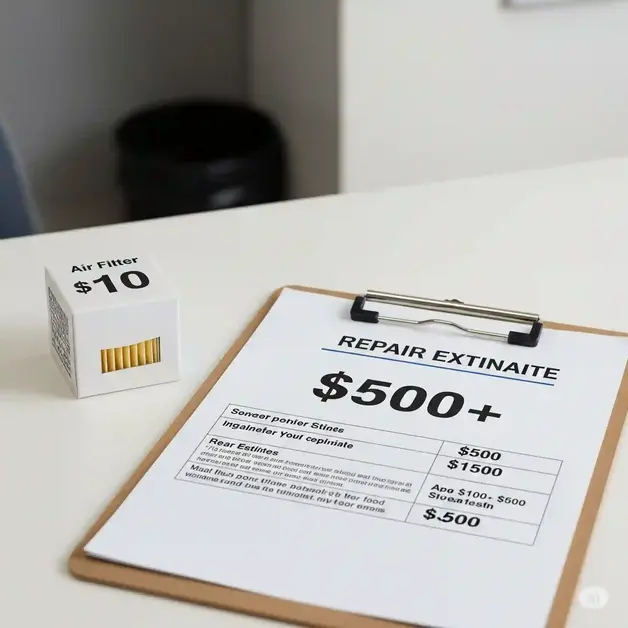
This one hits home hard. Preventive care is way cheaper than reactive repairs. Replacing a $10 air filter on time can prevent a $500 fuel system issue. I always keep a spare engine air filter in the trunk—cheap, quick to install, and it can save you from major engine trouble later on. That time I ignored a belt replacement? The belt snapped, damaged the radiator, and cost me nearly $800. A $50 fix became a disaster.
Routine auto maintenance saves money by catching problems early—before they snowball into major repairs. It’s like investing pennies today to save hundreds tomorrow.
4. Better Fuel Efficiency and Performance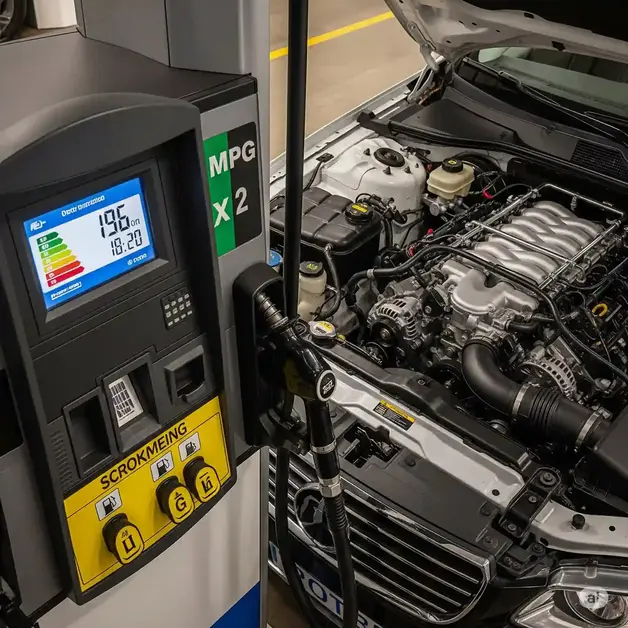
A well-maintained engine runs like a clean kitchen—everything flows better, faster, and with less waste. Things like dirty spark plugs, clogged filters, or low tire pressure quietly steal your fuel mileage every day. When I started getting regular tune-ups, I noticed my fuel economy improved by almost 3 MPG.
Keeping up with routine service boosts performance and helps your car burn fuel more efficiently. It adds up fast—especially if you drive a lot.
5. Protect Your Warranty (Especially on New Cars)
If you’ve bought a new car, you must follow the factory maintenance schedule to keep the warranty valid. Miss an oil change or delay a recommended service, and the dealer can deny claims. I know someone who skipped a scheduled transmission fluid flush and got stuck with the full repair bill—even though the car was under warranty.
Following your routine maintenance schedule is key to protecting your warranty and avoiding denied claims. It’s in the fine print—and it matters more than most people realize.
6. Preserve Resale Value
When it’s time to sell or trade in your car, a solid maintenance record can be your secret weapon. I once sold a 10-year-old sedan for above market value just because I had a well-kept service log. The buyer didn’t even haggle—they saw I cared for the car and trusted it would last.
Regular vehicle maintenance helps you keep more of your car’s value when it’s time to sell. Think of it as building trust for your future buyer.
7. Help the Environment
Believe it or not, your car’s health affects the planet too. A car with clean filters, properly inflated tires, and fresh oil produces fewer emissions and burns less fuel. Even something as small as fixing a minor exhaust leak can reduce pollution.
Routine maintenance reduces your carbon footprint by helping your car run cleaner and greener. Every small fix matters when multiplied by millions of cars on the road.
In short, routine auto maintenance isn’t just a chore—it’s a responsibility that pays off in safety, savings, and peace of mind. Whether it’s a simple oil change or a full inspection, keeping up with the maintenance on your vehicle is one of the smartest things you can do as a car owner. And trust me, your future self will be glad you did.
What Are the Main Factors of Car Maintenance?
When it comes to keeping your car happy and running strong, there are a few key areas you just can’t afford to ignore. Think of these like the basics of self-care—eat well, sleep enough, move your body. Your car has its own “health checklist,” and sticking to it makes all the difference. If you’ve ever asked what are the main factors of car maintenance, here’s the short answer: tires, fluids, battery, belts, hoses, and filters—these are the true unsung heroes.
Let’s start with tire care. Tires aren’t just rubber—they’re your car’s only connection to the road. Keep them inflated properly, rotate them regularly, and check for wear. I once skipped a rotation for over a year, and it led to uneven tread and a scary skid during rainy season. Lesson learned. Proper tire care prevents blowouts, improves fuel economy, and keeps your ride safe.
Next up: fluid checks. Your car runs on more than just gas. Oil, coolant, brake fluid, transmission fluid, and windshield washer fluid all play crucial roles. Each one does a job—cooling, cleaning, lubricating, or helping you stop on time. Low or dirty fluids can quietly damage your engine, brakes, or transmission before you even notice a problem. I make it a habit to check my oil and coolant monthly. A simple oil dipstick or coolant tester kit makes it easier than you’d think—even if you’re not super mechanical. It takes five minutes and saves a fortune down the line.
Then there’s battery health. Your battery is the spark of life for your car. A weak battery can leave you stranded without warning—been there, done that, in the middle of nowhere with no jumper cables. Check the terminals for corrosion and get it tested twice a year. Especially before winter. A healthy battery means reliable starts, fewer surprises, and less frustration.
Don’t overlook belts and hoses, either. These flexible parts keep everything moving—literally. A cracked serpentine belt can lead to overheating or a dead alternator. And hoses? One leak can drain your coolant fast and fry your engine. Ask your mechanic to check these at each service. Catching wear early on belts and hoses can stop major breakdowns before they start.
Last but not least: filters. Your engine air filter, oil filter, and cabin filter all help your car breathe cleanly and function properly. Dirty filters choke performance and lead to poor fuel mileage. Replacing them on time is one of the cheapest, easiest ways to protect your engine—and your lungs.
To keep things simple, I follow a basic schedule:
- Weekly: Check tire pressure and look for leaks under the car.
- Monthly: Inspect fluid levels and clean the battery terminals.
- Seasonal: Rotate tires, change filters, and inspect belts and hoses.
Staying on top of these tasks isn’t complicated—it’s just consistent care. And when people ask why is it important to keep up with the maintenance on your vehicle, I point to these exact basics. They might seem small on their own, but together, they’re what keep your car safe, smooth, and stress-free.
What Car Maintenance Is Really Necessary?
Let’s be honest—car service shops don’t always make it easy to tell the must-dos from the nice-to-haves. One minute you’re in for an oil change, the next you’re being pitched a $400 fuel system cleaning you didn’t ask for. So what car maintenance is really necessary? Here’s the short answer: if it keeps your car safe, reliable, and running smoothly, it’s worth it. Everything else? Depends on your budget and how long you plan to keep the car.
The non-negotiables? Oil changes, tire rotations, brake inspections, fluid checks, and air filter replacements. These are the bread and butter of vehicle maintenance. Skip them, and it won’t just affect performance—it’ll bite you later with costly repairs. I once pushed my oil change three months past due and paid for it with an engine knock that never went away. Sticking to factory-recommended basics keeps your engine healthy and your warranty valid.
Then there are the items that feel like upsells—but aren’t always. For example, transmission fluid flushes and coolant replacements. These aren’t needed every few months, but when your manual says it’s time, don’t ignore it. Same goes for spark plugs or cabin air filters. I used to skip cabin filters thinking they were just “extras”—until one winter my car’s heater blew out a dusty, musty mess every time I turned it on. Lesson learned.
A good rule of thumb I follow is this: if it’s in your owner’s manual, it’s real. Mechanics come and go, but your manual was written by the people who built your car. I keep mine in the glove box and check off services as I go. That one habit has saved me hundreds—and a ton of second-guessing.
What helps me most is prioritizing based on safety and cost risk. If ignoring it could leave me stranded or cost more down the line, it goes to the top of my list. For example, brake pads? High priority. Cosmetic fixes? Not so much. I’ve also learned to ask for the old parts back—it’s a good way to ensure the shop actually replaced what they said they would.
At the end of the day, car maintenance isn’t about doing everything—it’s about doing the right things at the right time. Stick to the essentials, know your car, and don’t be afraid to ask questions. Your car—and your wallet—will thank you later.
First Maintenance for a New Car: Why It Matters
If you’ve just driven off the lot with a shiny new car, congratulations! But don’t let that fresh factory smell fool you—your first maintenance for a new car is more important than it seems. Even though everything feels perfect now, that first service visit sets the tone for how your vehicle performs long-term. Skipping it can mess with your warranty and cause problems you won’t notice until it’s too late.
Most manufacturers recommend your first checkup somewhere between 500 and 5,000 miles, depending on the car. This isn’t just about an oil change—it’s a full system check. Fluids, belts, tire pressure, brakes, and filters all get reviewed. It’s like your car’s “health check” after the break-in period. When I brought my new car in around 1,000 miles, they actually caught a factory-installed air filter that had shifted out of place. I would’ve never known until it started choking performance.
Here’s something many people overlook: that first visit is often required to keep your warranty valid. If you skip it, the dealership can technically void coverage on things like the powertrain. And trust me, you don’t want to be on the hook for a transmission issue just because you delayed a $100 service.
I always tell friends: treat your new car like a new relationship. Show up early. Pay attention. Ask questions. The care you give it in the beginning will shape how it treats you for years. Your manual should have the factory maintenance schedule—follow that, not what the service desk tries to upsell.
If you’re wondering what’s usually included, expect things like engine oil and filter changes, fluid top-offs, battery checks, tire rotation, and sometimes software updates. It’s basic stuff—but it keeps your new investment in top shape. Think of it like getting your baby’s first doctor visit—it’s not about fixing anything yet, it’s about making sure nothing goes wrong later.
Bottom line? Don’t skip your first service—even if your car seems fine. It’s easy to ignore when everything’s working, but that early check can save you from expensive surprises and protect your warranty. It’s a small act that builds trust between you and your ride—and keeps the honeymoon phase rolling a lot longer.
Real-Life Experience: What Skipping Maintenance Taught Me
Let me tell you about the time I ignored my check engine light—and paid the price. It started off small. The light popped on while I was rushing to work, and I told myself, “It’s probably nothing.” A week passed. Then two. The car still ran fine, so I kept pushing it off. But here’s the truth: ignoring maintenance doesn’t make the problem go away—it just makes it worse and more expensive.
Fast forward about a month, and one morning, my car stalled in traffic—right in the middle of a busy intersection. Embarrassing, frustrating, and honestly scary. Turns out, the issue was a failing oxygen sensor that snowballed into clogged spark plugs and fuel inefficiency. What could’ve been a $150 fix became a $700 repair, not counting the tow truck and the time I missed from work. That was my wake-up call.
The funny thing is, deep down, I knew better. I’d read enough and had friends who preached about regular maintenance. But I let life get in the way. And that’s how most of us fall into the trap—we’re busy, we think it’s not urgent, or we assume it’ll cost more to fix now. But skipping basic care is like ignoring a leaky faucet: you’ll pay way more when the ceiling caves in.
That one mistake taught me more than any manual or YouTube video ever could. Now, I treat that little dashboard light like an early warning—not an annoyance. And I follow a checklist. Oil changes every 5,000 miles. Tire rotation on schedule. Quick inspections when anything feels even a bit off. It gives me peace of mind and saves me from the stress of surprise breakdowns.
So if you’re wondering whether that tiny noise, smell, or warning light is worth checking? It is. Every time. Car maintenance isn’t about being a “car person.” It’s about being smart and avoiding big regrets. I learned it the hard way—so hopefully, you won’t have to.
Quick Tips: How to Stay on Top of Vehicle Maintenance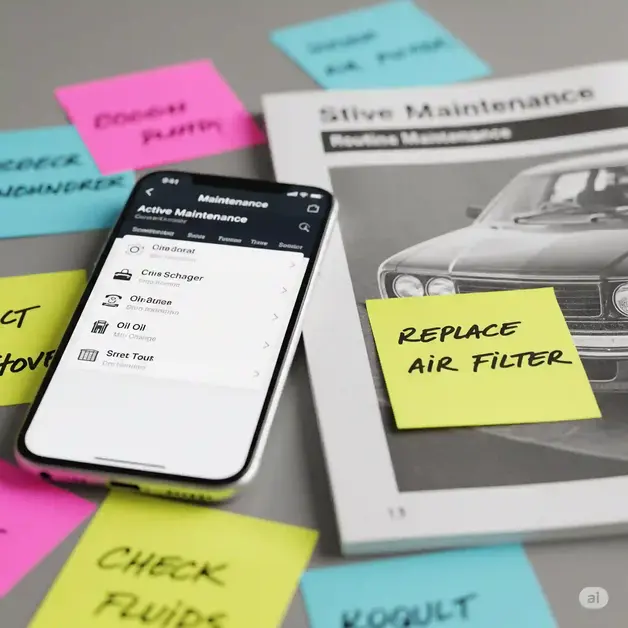
The truth is, keeping up with car maintenance doesn’t need to be overwhelming or time-consuming. Once you get into a rhythm, it becomes just another part of life—like brushing your teeth or charging your phone. The easiest way to stay on top of maintenance is to build simple habits that remind you before your car reminds you.
One trick that’s saved me more than once? Setting reminders on my phone. I have repeat alerts for oil changes every 5,000 miles and tire rotations every 6 months. Using a calendar app or maintenance tracker helps you remember even when life gets busy, and it’s way better than waiting until something starts making a weird noise.
Another game-changer is working with a mechanic you actually trust. I used to bounce between random shops, but once I found a good local guy who explains things in plain language, I stopped dreading service visits. Also, keeping a few basic tools on hand—like a tire pressure gauge, OBD2 scanner, or car battery tester—can help you catch small issues early, even before heading to the mechanic. Having a reliable mechanic gives you confidence and saves you from getting upsold on things you don’t really need.
Also, I recommend keeping a simple maintenance log. After that, I never travel without a reliable portable jump starter—they’ve come a long way, and some even double as phone chargers in emergencies. Or grab a car maintenance log book—they’re super handy and cost just a few bucks on Amazon. It helps you keep track, and when it’s time to sell or trade your car, that record makes a great impression. A buyer sees you cared, and it can actually bump up the price you get.
The key is consistency over perfection. You don’t have to be a car expert. You just need to pay attention, stay organized, and respond when your car tells you something’s off. Even 5 minutes every few weeks can keep your car healthier—and your wallet happier.
FAQs About Car Maintenance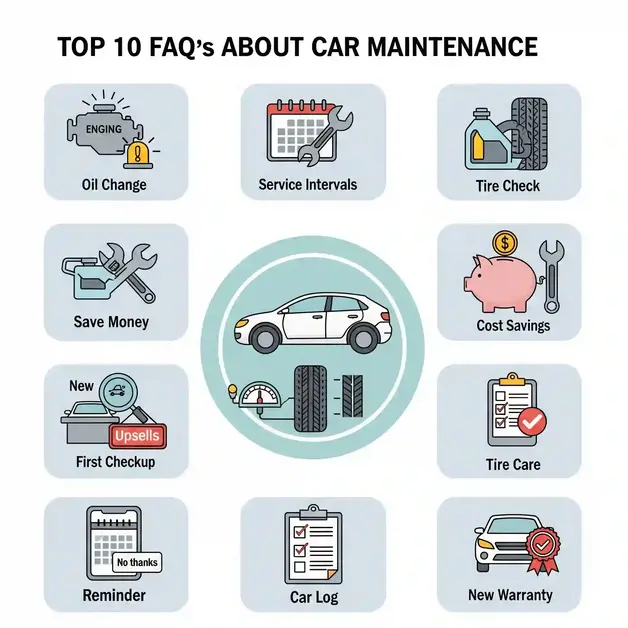
Q1: What happens if I skip regular vehicle maintenance?
Skipping routine maintenance can lead to breakdowns, expensive repairs, and safety risks. It also shortens your car’s lifespan and lowers its value.
Q2: How often should I get my car serviced?
Most cars need service every 5,000 to 7,500 miles. Always check your owner’s manual for the exact schedule based on your model and driving habits.
Q3: What is the most important routine car maintenance?
Oil changes, tire checks, and brake inspections are key. These simple steps help your car stay safe, run better, and avoid major repairs later.
Q4: Does regular maintenance really save money in the long run?
Yes, it prevents big repairs, improves fuel use, and keeps your car running longer. A $40 oil change now can save you a $4,000 engine bill later.
Q5: What should I check during the first maintenance for a new car?
Check the oil, fluids, filters, and tire pressure. The first visit also includes a systems check to spot any factory issues early.
Q6: Why is tire maintenance important?
Worn or underinflated tires can cause blowouts and poor fuel use. Keeping them in shape helps your car grip the road and saves gas money.
Q7: Should I trust dealer upsells during service visits?
Not always. Stick to your owner’s manual. Many upsells aren’t needed yet and only raise your bill without real benefit.
Q8: How can I remember when it’s time for maintenance?
Use a phone calendar, car app, or write it on a sticky note in your glovebox. Simple reminders help you stay on track without stress.
Q9: Will regular maintenance help my car’s resale value?
Yes. A well-kept service log shows buyers you cared for the car. It builds trust and helps you get a better trade-in or sale price.
Q10: Is vehicle maintenance really important for new cars?
Absolutely. Even new cars need basic care to stay covered by the warranty and catch factory defects early before they turn serious.
Conclusion: Your Car Will Thank You
If you’re someone who wants your car to stay reliable, safe, and fuel-efficient for years to come, keeping up with maintenance is honestly non-negotiable. But if you’re the type who tends to wait for things to break before fixing them, just know—it almost always ends up costing more, both in cash and stress. From my own experience, staying on top of the small stuff—like oil changes and tire checks—has saved me from big headaches down the road. Treat your car like a partner, not just a machine, and it’ll return the favor every mile.

